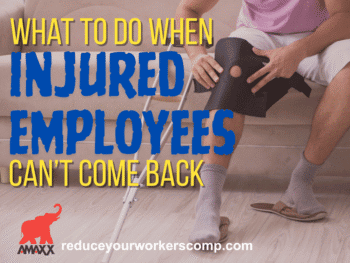AXIOM: The sooner an employee returns to work from a workers' compensation injury, the lower the overall cost of the workers’ comp claim will be.
Numerous documented studies show there is a definite correlation between time off work due to a work related injury and the employee's chances of continuing employment with your company.
Per U.S. Bureau of Labor Statistics
An employee who has been off work for 6 months has a 50% chance of ever returning to work.
An employee who been off work for a year has a 25% chance of returning to work.
Employees off work for more than 2 years rarely ever return to work.
However, employees who return to work in less than 7 days have almost a 100% chance of continuing their employment.
A well-managed modified duty return-to-work program can have a sizable impact on the cost of your workers' compensation program. These short-term programs expedite the employee's return to work by facilitating limited duty or modified duty for employees with a temporary condition preventing them from performing their regular duties.
A common myth is: Employees are reluctant to return to work on modified duty. While this may be true in a few cases, much more often it is the employer who is the reluctant one when it comes to having a modified duty program.
Supervisors who are not educated about the benefits of a return-to-work program or the true cost of workers' compensation often see modified duty as an inconvenience to themselves. Also, supervisors and managers often have a conflict between their productivity goals and the return-to-work program. If their own performance evaluation or year-end bonus is tied to their production goal, they (often subconsciously) place their own well being ahead of what is best for the company — the employee's return to work on modified duty.
What is an Off-Site Return-to-Work Program?
The solution for the employee, the employee, and the supervisor is the off-site return-to-work program. An aggressive off-site return-to-work program provides temporary job placements at a non-profit organization when the employee's medical restrictions cannot be accommodated by the employer. With an off-site return-to-work program, the supervisor or manager no longer has the conflict between the productivity goals and the return-to-work program, nor do they see an off-site return-to-work program as an inconvenience to themselves.
Some employers place employees in charity jobs, others use jobs at another job and still others use "cross-divisional" placements. National Job Finders at www.NationalJobFinders.com and Soar Research www.SoarResearch.com both place employees in alternate jobs at employers with realistic alternative jobs. Their call centers makes phone calls looking for openings at local employers. They first learn the employees medical restrictions then make phone calls to locate matching jobs. They then monitor the job seeking efforts. If the employees intentionally "blow" the job interview, the callers document these issues and eventually the false job seeking attempts may be used to discontinue the claims in some states.
An example of an off-site return to work program
A third party administrator who was handling the workers’ comp claims for both a national trucking company and nationwide charity arranged for truck drivers to return to work on modified duty at the charity's thrift stores. The truck drivers, often with musculoskeletal injuries, often had weight lifting, standing, and sitting restrictions. The truck drivers instead of reporting to their truck terminal for modified duty would be given off-site work at the charity's thrift stores. The truck drivers sorted donated clothing. They were allowed to sort clothes seated at a table, or stand or walk, as they needed, to accommodate their restrictions from their medical provider. (workersxzcompxzkit)
When an employee is unable to return to work full time for the employer and the employer is unable to provide appropriate modified duty work, the off-site return to work program becomes an attractive option to the employee. An off-site return-to-work program provides several benefits to the employee that the employee would not get if forced to stay home from work.
Podcast: KNOW the New OSHA Recordkeeping Rules — OR Risk Fines and Criminal Penalties. Click Here: http://www.workerscompkit.com/gallagher/podcast/Non_Compliance_with_Recordkeeping_Standards/



























